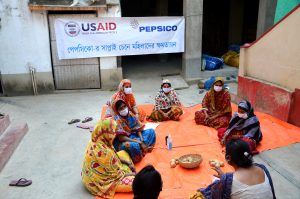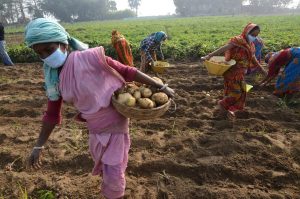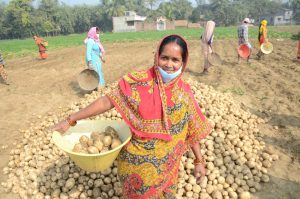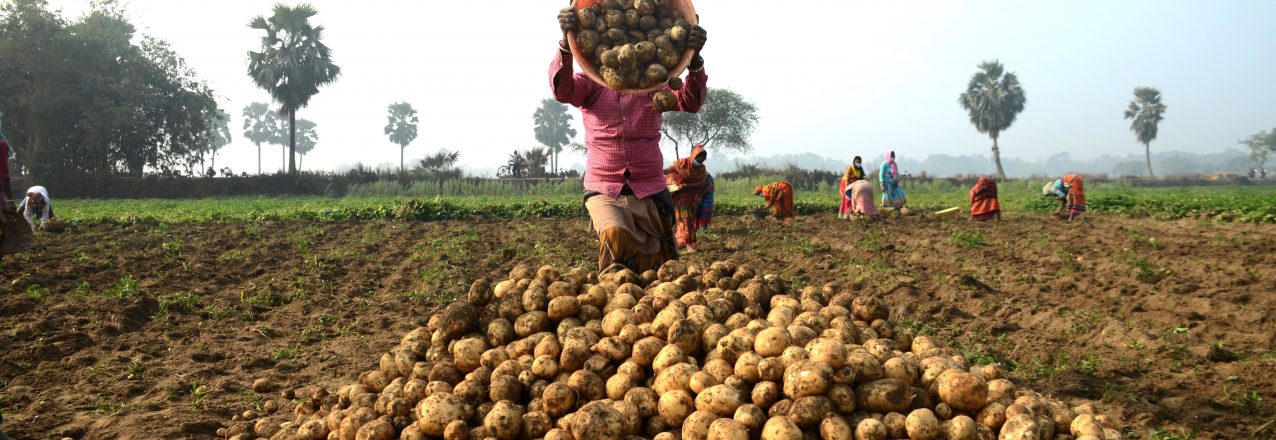A Q&A with PepsiCo and USAID on making the business case for women’s empowerment and combating climate change in West Bengal, India
Cross-posted from the USAID Medium blog
Climate change is not gender neutral. It impacts women and girls — in all their diversity — more severely. USAID works with global companies like PepsiCo to advance women’s empowerment and gender equality while combating the climate crisis.
Launched in 2019, a USAID-PepsiCo partnership is empowering women farmers with new skills and knowledge under PepsiCo’s Sustainable Farming Program in the potato value chain in West Bengal, India.
Margaret Henry, PepsiCo’s Director of Sustainable Agriculture; Sarah Lowery, Economist & Public-Private Finance Specialist in USAID’s Land and Resource Governance Division; and Corinne Hart, Senior Gender Advisor for Energy and Environment at USAID’s Gender Equality and Women’s Empowerment Hub, discuss how USAID and PepsiCo are working together to equip women farmers with skills to adapt to the effects of climate change.
Why did PepsiCo and USAID partner in India?
Margaret: PepsiCo and USAID came together in West Bengal, India, to form a partnership to demonstrate the business case for women’s empowerment. PepsiCo has had a long-standing commitment to sustainability and to farmer livelihoods, but we knew we couldn’t solve all the problems alone. We partnered with USAID to expand our ability to influence and benefit the women of West Bengal, who are an integral part of our farming communities.
Sarah: USAID is increasingly focused on developing private sector partnerships in order to scale up development results, and we were excited that PepsiCo was interested in understanding how women’s empowerment can advance its business goals.

Women are often ignored in the agricultural sector. How can the USAID-PepsiCo partnership change that?
Sarah: Women produce 60 to 80 percent of food across the world, but they own a mere fraction of the land that they farm. They are also less likely to control resources, receive technical training, and enjoy the financial benefits from commercial farming. In West Bengal, women have important roles throughout the potato supply chain, and this partnership ensures that women have access to land and the knowledge and skills they need to excel in these roles.
Margaret: By making sure that the women in our supply chains are able to benefit from the support that we provide our farming communities, we can ensure that the productivity and resilience of all of our farms can increase.

What are some of the results you have seen from this partnership for women farmers and PepsiCo?
Corinne: In addition to greater access to land and productive resources, the partnership in West Bengal is engaging all members of household and local champions like potato aggregators to shift gender norms that limit women’s participation and benefit sharing. Over the past two years we have seen women gain mobility, decision-making power over farming decisions and household income, and confidence as lead farmers and community agronomists. Women’s families and communities increasingly acknowledge their roles and the skills they bring to potato farming.
Margaret: We are working with women farmers to ensure that they are recognized as our farmers, laborers, partners, and everything in between. We are seeing that empowering women in our supply chain can lead to improved business performance in productivity, quality, profitability, loyalty, and sustainability.
How can empowering women increase productivity and mitigate the effects of climate change on agricultural supply chains?
Margaret: Every day, farmers face critical challenges from climate change, and we want to work with them to not only reduce the impact of agriculture on climate change, but to help them adapt to the changes that are coming. By empowering women, we empower our supply chains to do better. Not only in terms of productivity, but with environmental performance and adaptation to the kinds of events associated with climate change.
Corinne: Women are disproportionately affected by climate change, and they play a crucial role in climate change adaptation, mitigation, and resilience-building for whole communities. Since women are engaged in so many farm tasks, they have the capacity to track what a farm is doing and understand how to help it to adapt and ensure sustainable approaches are utilized. By putting the right tools and resources in the hands of women farmers, they can help their families and communities get ready for the changes that the climate crisis is bringing.

How are USAID and PepsiCo scaling this partnership in West Bengal to meet global gender equality and climate goals?
Corinne: In 2020 USAID and PepsiCo began a Global Development Alliance, a five-year, $20 million co-funded partnership to demonstrate that investing in women in PepsiCo’s supply chains can lead to greater profitability and sustainability, as well as development outcomes, like gender equality and economic growth. Evidence-based approaches to improve women’s access to resources, land, skills, and employment, alongside robust data collection, will make a compelling business case for scaling to additional PepsiCo markets and influencing other global companies sourcing from rural communities. By integrating gender equality and women’s empowerment into PepsiCo’s global sustainable agriculture strategy, the GDA is directly contributing to climate change mitigation and adaptation efforts throughout their agricultural supply chains around the world.
Margaret: PepsiCo is working with farmers in the 60 different countries that we source from to improve farming livelihoods, promote women’s empowerment, work on regenerative agriculture farming practices, reduce their vulnerability to climate change, reduce the emissions that are coming from those farms, and improve the watershed health and biodiversity on those farms. PepsiCo’s Sustainable Farming Program helps farmers understand how to make progress on the most critical social and environmental issues that they face, while ensuring that they remain economically viable.





